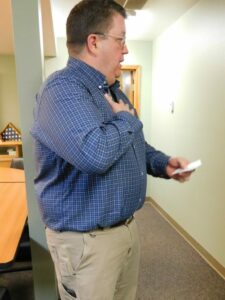
The Fort Scott City Commission had a special meeting on Dec. 30 to sign off on a letter to Kansas Attorney General Derek Schmidt.
This was in response to local citizen Michael Hoyt’s protest alleging Kansas open meetings violations by the commission.
“I wrote on behalf of the city and commission in reply to an inquiry from Lisa Mendoza of the Kansas Attorney General’s office,” Jeffrey Deane, Lauber Municipal Law, LLC, Lee’s Summit, MO, said in an email to FortScott.Biz. Deane is the new Fort Scott City Attorney, replacing Burton Harding.
The city response letter was approved Dec. 30 by the commission and signed.
Hoyt’s Allegations
Hoyt alleged the city commission violated the Kansas Open Meetings Act when it prepared and signed a letter objecting to the candidacy of Kevin Allen, outside of an open meeting.
“It is now a public record and to save you the time of making a KORA request of us or the attorney general, I am providing this copy for information,” Deane said in an email to FortScott.Biz.
Hoyt sent a letter to the attorney general that a “notice of objection” was prepared and signed by each member of the Fort Scott City Commission on August 23, 2019.
The allegation is that the commissioners were acting together as a governmental body for the citizens of Fort Scott, in violation of the Kansas Open Meetings Act (KOMA), according to Hoyt’s complaint.
The KOMA violation form was dated 10-10-2019 and signed by Hoyt.
To view the complaint to the attorney general, click below:
The City Attorney’s Response
“This allegation is baseless,” Attorney Deane noted, “in that
1) the commission, as the governing body, lacked the legal power and/or standing to contest Mr. Allen’s candidacy;
2) the August Letter was executed by five individuals, qualified under law as registered voters to lodge the contest, and not as an action of the governmental body; and
3) the provisions of KOMA did not attach to the actions of the commissioners acting on power granted to them individually by law and not in their official capacity.
For these reasons there was no KOMA violation.”
The Fort Scott City Attorney’s conclusion of the issue is as follows:
“Mr. Hoyt’s allegations stem from a flawed reading of the laws that govern this issue,” Deane states in the response to the attorney general. “The KOMA requires meetings when the governing body is transacting the business or affairs of government. As the analysis sets out above, the power and standing to raise an election contest is a personal right reserved and granted only to registered voters. A governmental subdivision such as the city, even though its duly elected governing body, lacks the legal power to lodge a
contest. As a result, the August Letter, even though signed by the five individuals that are also commissioners, could only be the expression of the individual’s power and standing to contest.”
To view the complete response, click below:
20191229 Fort Scott Reply to AG letter Final
Course Of Action To Be Determined
Assistant Attorney General Lisa Mendoza, who is also on the Open Government Enforcement Unit, said in the letter that once a response from the city is received, a proper course of action will be determined.
This may include further investigation, closing the matter or seeking appropriate remedy for any KOMA violations.
As a remedy, Hoyt seeks the entry of a consent order, admission of a violation and a $500 fine per commissioner, according to the letter from Mendoza.
Background Of The Issue
From Attorney Deane’s response to the attorney general:
The November 2019 Fort Scott City Commission elections were passionately contested.
Fourteen candidates filed for the city commission seats held by Commissioners Cheryl Adamson, Cindy Bartelsmeyer, and Mayor Jean Parker.
The August primary elections pared the 14 candidates down to six for the general election.
Rumors were circulating about Kevin Allen, alleging that his primary residence was his home on Brown Street, which is outside the boundary of the city limits, according to the letter from Attorney Deane. Allen used the address of Skitch’s Hauling & Excavating, Inc., his business address, on East 20th Street as his residence.
City ordinance and state law require candidates for city office to reside in the corporate boundaries of the city where they will hold office.
The allegation that Allen lacked the residence to hold office in Fort Scott was generally known to the electorate, including the individual city commission members, Deane’s letter stated.
“Cheryl Adamson authored the August letter, as an individual contest of Mr. Allen’s residency to hold office, to which Cindy Bartelsmeyer, JoLynne Mitchell, Randy Nichols, and Jean Parker joined,” Deane said in the response letter.
The letter could only have been brought by individual registered voters under state law and not by the city commission acting in its official capacity, Deane stated
The August letter was accepted by the Bourbon County Election Officer and a board convened for a full hearing on the matter.
The election board determined that even though Allen had several conflicting addresses in and out of the boundaries of Fort Scott, his claim of legal residence at the East 20th Street business address was sufficient to support candidacy and the election continued, according to the Deane letter.